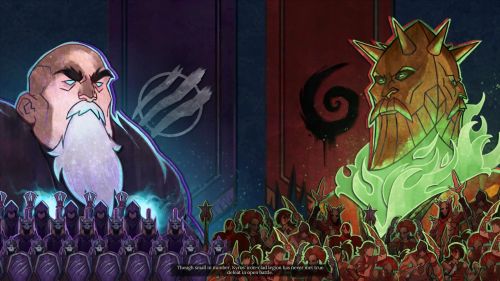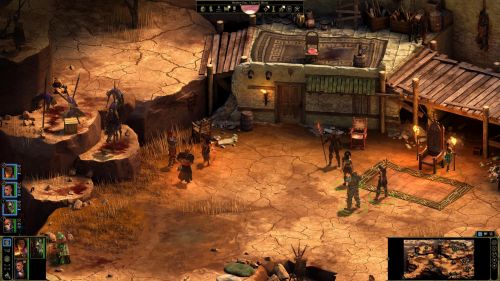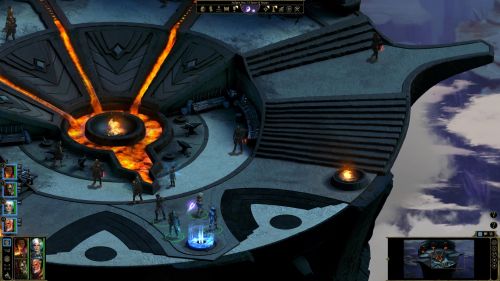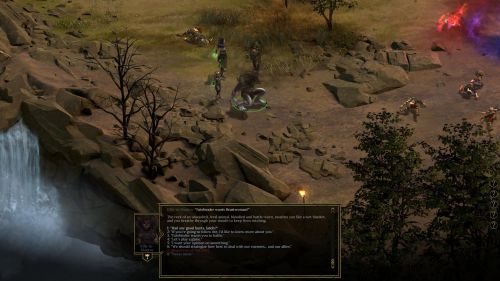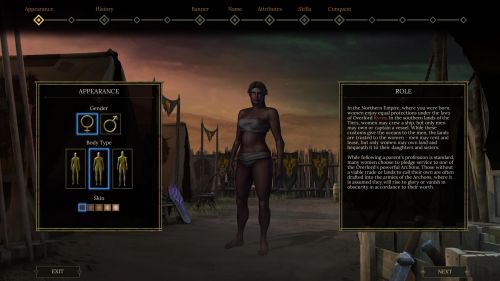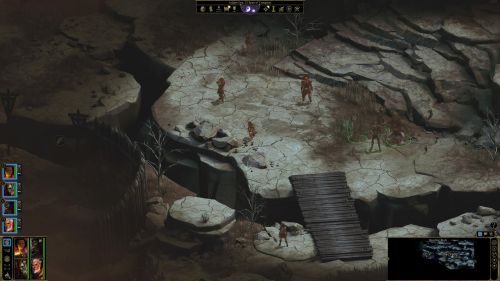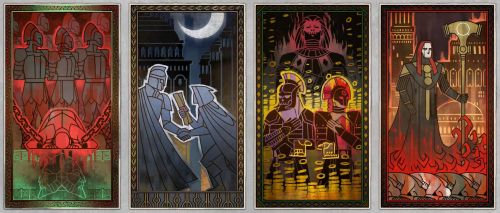RPG Codex Review: Tyranny - Kyros Demands Better
RPG Codex Review: Tyranny - Kyros Demands Better
Review - posted by Infinitron on Wed 30 November 2016, 16:46:21
Tags: Obsidian Entertainment; Tyranny[Review by Prime Junta]
Back when I was a little nipper, when computers ran on ferrite cores and we used smokily-burning slivers of resinous wood for light in the long Northern winter nights, we had these things called “choose your own adventure” books. The paragraphs were numbered, and at the end of each there was a text like “To side with the Disfavored, go to 232. To side with the Scarlet Chorus, go to 118.” The story would then play out in different ways depending on your choices, and some of them would lead to gruesome deaths.
If you like your CYOAs, you’ll find a lot to love in Obsidian Entertainment’s Tyranny. It opens with an actual CYOA sequence on a beautifully animated map with brass military tokens pushed around by an off-screen general’s hand, recounting the story of your involvement in Kyros the Overlord’s invasion of the last bastion of the free world, the Tiers. This sequence will set up the starting state of the world and give you a history in it. It is immensely significant all through the game proper, as it determines how the various factions will relate to you. If you’ve made a faction angry at you before the game even started, you will have an uphill battle to bring them around later on, if indeed you’re able to do it at all.
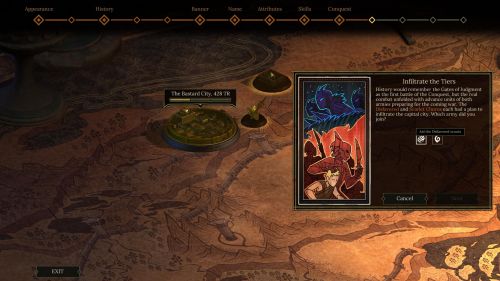
Don't skip Conquest. It gives a great intro to the setting and the story, and exploring the different ways it can play it is fun in its own right. Also, pretty.
Choose Your Own Tyranny
The initial sequence alone has more branching than most actual games, and it only gets better as you get deeper in. Many of your choices have consequences that will only become apparent later. The first chapter is the only part of the game where you can “do everything” in the usual cRPG idiom, completing all the quests for all the factions in it. However, choices you make in it determine the overall trajectory of the second act and set the menu of your available choices in it. You will gain Favour or Wrath with the main factions in it, and your choices determine who is willing to work with you in the future, and who is not.
At the end of the first chapter, you will have to side with one of the Overlord’s armies: the proud, disciplined, ruthless Disfavored united by blood and a burning love for their general, Graven Ashe the Archon of War, or the raging horde of the Scarlet Chorus, led by the demoniac Voices of Nerat, Archon of Secrets… with even more options if you dig for them.
If that was the only big choice in the game, it would already be more than most have. The Witcher 2: Assassins of Kings was justly lauded for a similar choice you could make at the end of the first chapter, which gave you two completely different paths through the second one. In Tyranny, however, that is only the start. You will have to choose whether to remain loyal to your chosen ally or betray it – for which you will be given many opportunities –, which other factions you want to cultivate and which ones to anger; you can do your best to be a hard but fair servant of Kyros’s laws, or a self-serving tyrant; you can attempt to bring a drop of decency and humanity to a world where evil did, indeed, win, or you can attempt to steer a path somewhere between these extremes. All these choices will play through the entire game, and ultimately bear fruit in the final act.
These choices matter. Play the game three times making different choices along the way, and the experience will be dramatically different each time. Story-gated locations and quests will open up or be closed off. You will find yourself shoulder to shoulder with characters you condemned to death by torture or slew by your own hand in a previous game. You will learn more of the world of Terratus and its inhabitants every time. You will also fail to achieve your goals, for want of sufficient cunning, force, reputation, or your previous choices, many of them all the way from the starting sequence.
If you play Tyranny like you’re used to playing cRPGs, or if you’re expecting the type of freedom you get in an exploration-based, sandbox game in the vein of a Fallout or Arcanum, you might miss out on a lot of this branching. Simply running errands for your chosen faction leader will get you to the endgame, and the smaller choices you have made along the way will affect it. If you only play through the game once, the experience won’t feel much different from a typical, linear game, however.
Things get more interesting if you inject a bit of role-play into the role-playing game, set yourself an agenda, and attempt to push against what the waiter presses on you. If you want to be a secret rebel sympathiser and stick to that from the start, you can do that and see the consequences play out. If you’re a true believer in Kyros’ mission but consider the warring factions’ loyalties suspect, you can ally with one of them out of expediency, undermine the alliance every opportunity you get, and ultimately bring the perfidious Archon to face his just deserts before the impassive face of Tunon the Archon of Law. And if you just want to carve yourself a realm to rule on your own, you can do that too. Some of these paths aren’t exactly easy, and many will be blocked off entirely due to choices you made very early in the game. Have the rebel leaders executed, and you won’t be able to join the rebellion later on even if you’re having second thoughts about your current loyalties.
Tyranny eschews the endgame dungeon that you would traditionally find in a game of this type. Instead, you will continue to play in the arena your actions shaped in the second act. The consequences of your choices through the game will come to fruition, and you will have to make a final accounting of your actions. While the denouement is satisfying enough, the last part of the game feels rushed. The build-up leads you to expect a change of pace and a new set of challenges, but instead you go directly to wrap things up. In my first playthrough, I spent somewhat under ten hours in the first act, about twenty in the second, but less than two hours in the third. I couldn’t help feeling that the team wanted to do more, but as so often happens, ran out of time and resources.
Three playthroughs will not come close to exhausting the story branches of Tyranny. It feels like a really good tabletop role-playing game campaign where you’re thrown into the middle of a complex, messy conflict between warring factions and will have to muddle your way through – except in a CYOA-style computer game, all of these story branches had to be thought up in advance. That Tyranny accomplishes this with only a few situations that don’t quite make sense or give you the freedom of choice you would expect is a remarkable achievement, and one that all but guarantees the game a lasting appeal with a cult following.
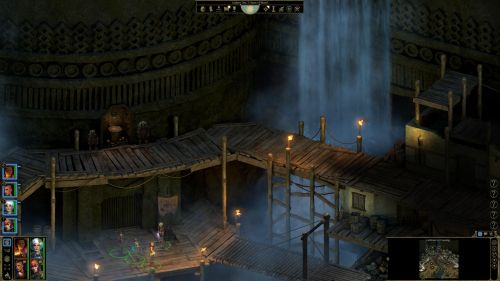
The overland locations are well thought-out and they look good. They feel like actual places, not just stage props.
More Than Just A Backdrop
Tyranny’s world-building is similarly inspired. Terratus has more in common with, say, Steven Erikson’s Malazan Book of the Fallen than Western traditional fantasy. Demigods – Archons, resembling Malazan’s Ascendants in the vein of Anomander Rake, Caladan Brood, or Cotillion – walk the earth. Kyros the Overlord issues magical Edicts that rain destruction of Biblical proportions on his enemies, turning entire realms into fire and ash, howling sandstorms that strip flesh from bone, or causing the earth to split into quaking chasms which swallow entire armies. Phalanxes clad in iron and bronze clash on blood-caked battlefields. Vast, mute remnants of a mysterious past civilisation tower over the landscape. The world is thoroughly thought-out and beautifully brought to life with a confident and consistent look, feel and sound, from the animated interludes to architecture, costumes, and tortured landscapes devastated by Kyros’ Edicts.
It is not just for show, either. Real thought has gone into imagining how a world like Terratus would work: what it would mean to have beings of godlike power striding among mortals, how their power struggles would play out, how it would change war, laws, life, and death. The logic of factions like the Scarlet Chorus – a chaotic horde where your way to promotion is killing your superior officer – is explored in detail. The Archons themselves are archetypes, somewhat cartoonish embodiments of War, Chaos, or Law, but the little people eking out an existence at their feet are depicted with nuance, with redeeming as well as villainous features.
Tyranny does an excellent job of integrating defining characteristics of the world into the story and mechanics. Your stronghold isn’t just a power trip, resource sink, and crafting workbench (although it is all that too): it becomes a fundamental part of your story and a voyage of discovery in and of itself. Likewise with the divine-scale magic of Kyros’ Edicts: they’re not just something that happens in the background, but something that you are intimately involved with from the very first beats of the story. There are unique artefacts scattered around the world – legendary weapons, pieces of armour, or just odd magically-imbued trinkets with powers which wax and wane with your renown – and they too can become central to your story, depending on the path you take through it. Terratus is more than a pretty backdrop for dragon fights, and exploring its intricacies is sure to delight anyone who wants something different and more thoughtful than your basic totally-not-Forgotten-Realms.
No Fun Allowed
The otherwise excellent writing falls a little flat when it comes to companions. You command a party of four, and have a roster of six to draw from. All but one represent a faction, and will serve as sounding boards for your thoughts as well as giving advice on how to approach them. While they have fully-developed personalities and back stories which unfold through long downtime conversations with them, they’re not as immediately relatable or even likable as you might hope. Partly this is due to power relations. Your position as judge, jury, and executioner of Kyros’ law, and in some cases conqueror and slavemaster, will necessarily put a certain distance between you and them. Whatever the reasons, they are a bit of a grim bunch, and don’t do much to lighten the mood of dark and bloody Terratus.
Tyranny breaks from convention with its companions in certain other ways as well. One of your companions is an actual Archon, albeit a junior one. She is higher-level than you are, and as she levels up, will gain powers that outstrip yours. Several others start out higher-level than you as well. Moreover, each companion has a unique talent tree that you will not be able to choose for your main character. You just can’t build yourself into a healer as effective as Lantry, or buffer/debuffer/disabler as Sirin.
Shame About The Gameplay
So, a deep, original, and atmospheric world confidently written and executed, story branching to make a grown man weep, original concepts explored in depth and integrated to the game mechanics and story, beautiful visuals and music… did Obsidian hit it out of the park and produce a true classic for the ages? Sadly, no. The trouble is, the game just isn’t all that much fun to play.
Tyranny is based on the engine Obsidian developed for Pillars of Eternity. If you’ve played it, you’ll be immediately at home with the overall look and feel, the user interface, and basic gameplay. Other than a few inexplicably-changed keyboard shortcuts, everything is at your fingertips and works pretty much like you’d expect. As befits a game based on a mature engine, all of that works very well. The problem is that where they changed the Pillars formula, they almost invariably changed it for the worse.
If Pillars resembles 4th edition D&D as executed on a modernised Infinity Engine, Tyranny’s mechanics look to Dragon Age: Origins for inspiration. Almost all abilities and spells are behind cooldown timers. Only a few artefact and reputation abilities – unlocked by gaining Loyalty and Fear with the companions, Favour and Wrath with factions – are per-rest or per-encounter. However you set up your party, you will end up with a big bunch of cooldown timers ticking down, which means that moment-to-moment gameplay in combat is largely a rote exercise in firing them over and over as soon as they become available. Party AI could mitigate this but regrettably all settings other than Passive will have them running around like headless chickens and doing really stupid stuff, so you will probably not want to be using it a lot.
Perhaps because of the relative lack of restrictions on ability use, combat has been balanced to favour defence. Your attacks have impressive animations and FX but ultimately most of them end up chipping away at a mountain of hit points and perhaps slapping on a debuff. There are abilities that let you change position, get out of trouble, heal, defend, and what have you, and you do need to use them sensibly to win fights, but this doesn’t require a lot of thought beyond common-sense stuff like “use a healing ability when low on health” or “use an escape ability when mobbed.” Offensive abilities especially lack impact, and area-of-effect attacks don’t require much care or thought because the game features no friendly fire. Jacking up the difficulty doesn’t even make the game all that much harder – except for a couple of the toughest boss fights – and certainly doesn’t make it more fun: it just makes it take that much longer to wear down the mobs.
Since most abilities are cooldown-based, there isn’t much strategic resource management. Instead of running out of spells, you will have to rest to heal Wounds. If your health falls below a certain threshold in combat, you will acquire a Wound, and if you’re knocked out, you will get several. Wounds impair your abilities. While a single Wound won’t make much difference, by the time you’ve racked up four or five, you will be significantly weakened and will want to take a rest. Resting expends camping supplies, but they are plentiful and you will be carrying more than enough. To dissuade players from resting too much, the first chapter of the game comes with a timer: let it run out, and it’s Game Over. The timer is quite generous, though; I didn’t feel particularly stressed by it and finished it with five or six days left on the clock each of the four times I played through it, and I did a pretty thorough job of exploring and sidequesting.
The rote combat is compounded by a lack of variety in enemies. In contrast to Pillars’ enormous bestiary, Tyranny only has three categories of enemies: humans, Beastmen (who fight more or less like humans), and wraith-like Banes. You will face more or less similar groups of tanks/damagers/ranged attackers/casters (when facing humans) and scrubs/bosses (when facing Banes). Some of the set-pieces – capturing a river crossing, village, or fort – are enjoyable enough, as pushing through a map to capture an objective gives the fights a sense of purpose and direction. Most, however, just have you doing the same thing over and over again. There are a few boss fights, but they are extremely formulaic; you will have to polish off a few waves of minions while avoiding the boss’s nastiest special attacks (helpfully broadcast in a tooltip over the boss), and then whittle away his massive mountain of hit points.
The dungeons are similarly uninspired. Good dungeons have variety and suggest some reason they’re there. Perhaps it’s a ruined fortress, ancient prison, warren of caves, catacomb, temple, or sewer complex. If, however, it’s nothing more than a sequence of rectilinear blue-lit corridors with key-and-switch puzzles, traps, the occasional ambush, and no apparent rhyme or reason beyond being a set of hoops for you to jump through, it will be a let-down. What ought to be a high point feels phoned-in, especially in contrast to the thought that went into the design of the villages, settlements, and other above-ground locations.
Tyranny also suffers badly from an inverted difficulty curve. If you get through the final fight at the end of the first act, you will find the game plain sailing from there on out. Once you hit level 15 or so, there won’t be much there that can challenge you. This is particularly regrettable as some of the enemies you face near the end of the game are supposed to be among the most powerful beings to stride Terratus. Having them go down easier than a ragtag group of human rebels makes no kind of sense, even if some special effects are involved.
Tyranny Knows No Class
Tyranny has a superficially classless character system. “Superficially,” because in actual fact each companion has two or three unique talent trees, while you have six not available to them, which differentiates the characters as effectively as any class-based system would have done. As usual, many of the best talents are fairly deep down the tree, which means that mixing talents from different trees has a fairly big drawback and you will be drawn to specialise in one or at most two of them at a time.
There is also a parallel spell system that lets you craft spells from sigils you can discover around the world. To create a spell, you combine a Base (fire, illusion, life…) with an Expression (single-target, AoE…) and zero or more Accents (range, power, combined affliction…). The Lore requirement of the spell goes up the more powerful you make it. The system could work well in principle and fits the world thematically, but in practice it becomes a chore: you prepare a basic selection of spells in each of your casters’ slots and periodically check in to upgrade them as their Lore goes up and you discover more sigils. You will be able to produce some pretty powerful effects once your Lore goes past 100 or so, but it’s still a far cry from even Dragon Age: Origins’ magic, let alone Pillars of Eternity’s or the classics’ in whose footsteps Tyranny follows.
What’s more, each of the three spellcaster companions has a talent tree with spells which eclipse the sigil-based magic, especially during the first two-thirds of the game. Lantry’s “Preservation” tree, for example, has by far the best healing spells in the game. The player character does not have access to similarly powerful specialised magic: although one of your talent trees is called “Magic,” it is actually mostly about enhancing weapon attacks with a magic staff, which a caster PC won’t be doing much anyway since he’ll be chain-casting those cooldown-based spells. The non-Magic trees have some spell-like talents which put the actual spells to shame too: your most impressive fireball isn’t actually a spell or in the magic tree at all, it’s a talent in the Ranged tree that makes your javelin go kaboom. Overall, the system feels incoherent, shallow, and restrictive. The classless system fails to deliver the flexibility you would expect in one, and leaves you just as locked into your chosen role – damager, tank, archer, caster – as you would be in a class-based system.
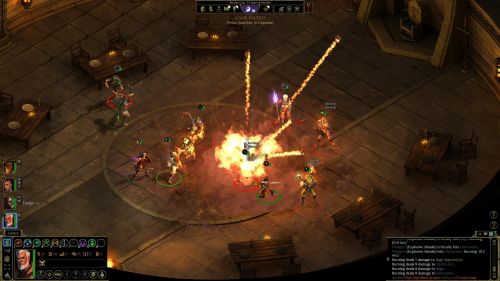
That's not a fireball. This is a fireball! A special javelin-throw actually. Also it doesn't do all that much damage.
The skill system is based on learn-by-doing which you can complement by buying training from trainers. Level advancement is also contingent on exercising your skills. Support skills like Subterfuge (lockpicking and sneaking) and Athletics will quickly become trivial as they will overshoot all the thresholds in the game: past Act 1, I didn’t encounter a single skill-thresholded check I couldn’t pass. The only skill to which I did pay attention was Lore, and that only when intentionally focusing on the spell system. The best that can be said of it is that it does function as a leveling-up mechanism, and there aren’t that many obvious ways to abuse it. It does not do much to promote creative character-building, reward specialisation, or encourage looking for alternative solutions to challenges.
Tyranny’s gameplay problems are something of an own goal for Obsidian. Pillars of Eternity has an excellent character mechanics system. They could easily have leveraged its classes, abilities, talents, and skills in addition to the basic engine features, with a light re-skinning to fit the Bronze Age setting, and given some of its massive bestiary the same treatment. If D&D can do anything from Oriental Adventures to Dark Sun and the Infinity Engine could accommodate both Icewind Dale and Planescape: Torment, the Eternity Engine could surely have accommodated Tyranny. The systems the team built to replace Pillars’ are shallow, incoherent, and unenjoyable. They make the gameplay as formulaic, rote, and uninspired as the world-building and campaign are exciting, confident, and original.
Kyros Demands Better
Tyranny has the makings of a cult classic. The depth and originality of the setting, the integration of the most unique features of the setting into the gameplay, the presentation, and the dizzying variety of adventures to choose give it replayability and lasting appeal that few games can manage. The game ends on a cliffhanger, so it is clear that Obsidian wants to produce a sequel. If and when they do, I hope they will give serious thought to making the game as fun to play as it is engrossing to explore.
While cooldown-based gameplay is inherently problematic – it is really hard not to have it devolve into rote pushing of awesome-buttons as timers wind down – it doesn’t have to be a total chore: Dragon Age: Origins demonstrated that much. More imaginative dungeons and encounters, a bigger and more varied bestiary, a better and more clearly-differentiated magic and ability system, and overall balance tilted to favour attack over defence would help bring its combat up to DA:O standards at least, if ditching the cooldowns altogether is not on the cards.
I would dearly love to see more games give the kind of attention to world-building, story branching, choice, and consequence that has gone into Tyranny. Other than Age of Decadence, coincidentally also set in a grim pre-Medieval world, this hasn’t been done in this scale in recent years. Tyranny feels like a great tabletop campaign by a gamemaster who digs worldbuilding and intrigue but isn’t into dungeon crawling or the fighty bits in general. That is a shame, as games are made to be played rather than read or watched. As it stands, Tyranny is worth a spin despite the gameplay rather than because of it. Kyros demands better.
Back when I was a little nipper, when computers ran on ferrite cores and we used smokily-burning slivers of resinous wood for light in the long Northern winter nights, we had these things called “choose your own adventure” books. The paragraphs were numbered, and at the end of each there was a text like “To side with the Disfavored, go to 232. To side with the Scarlet Chorus, go to 118.” The story would then play out in different ways depending on your choices, and some of them would lead to gruesome deaths.
If you like your CYOAs, you’ll find a lot to love in Obsidian Entertainment’s Tyranny. It opens with an actual CYOA sequence on a beautifully animated map with brass military tokens pushed around by an off-screen general’s hand, recounting the story of your involvement in Kyros the Overlord’s invasion of the last bastion of the free world, the Tiers. This sequence will set up the starting state of the world and give you a history in it. It is immensely significant all through the game proper, as it determines how the various factions will relate to you. If you’ve made a faction angry at you before the game even started, you will have an uphill battle to bring them around later on, if indeed you’re able to do it at all.

Don't skip Conquest. It gives a great intro to the setting and the story, and exploring the different ways it can play it is fun in its own right. Also, pretty.
Choose Your Own Tyranny
The initial sequence alone has more branching than most actual games, and it only gets better as you get deeper in. Many of your choices have consequences that will only become apparent later. The first chapter is the only part of the game where you can “do everything” in the usual cRPG idiom, completing all the quests for all the factions in it. However, choices you make in it determine the overall trajectory of the second act and set the menu of your available choices in it. You will gain Favour or Wrath with the main factions in it, and your choices determine who is willing to work with you in the future, and who is not.
At the end of the first chapter, you will have to side with one of the Overlord’s armies: the proud, disciplined, ruthless Disfavored united by blood and a burning love for their general, Graven Ashe the Archon of War, or the raging horde of the Scarlet Chorus, led by the demoniac Voices of Nerat, Archon of Secrets… with even more options if you dig for them.
If that was the only big choice in the game, it would already be more than most have. The Witcher 2: Assassins of Kings was justly lauded for a similar choice you could make at the end of the first chapter, which gave you two completely different paths through the second one. In Tyranny, however, that is only the start. You will have to choose whether to remain loyal to your chosen ally or betray it – for which you will be given many opportunities –, which other factions you want to cultivate and which ones to anger; you can do your best to be a hard but fair servant of Kyros’s laws, or a self-serving tyrant; you can attempt to bring a drop of decency and humanity to a world where evil did, indeed, win, or you can attempt to steer a path somewhere between these extremes. All these choices will play through the entire game, and ultimately bear fruit in the final act.
These choices matter. Play the game three times making different choices along the way, and the experience will be dramatically different each time. Story-gated locations and quests will open up or be closed off. You will find yourself shoulder to shoulder with characters you condemned to death by torture or slew by your own hand in a previous game. You will learn more of the world of Terratus and its inhabitants every time. You will also fail to achieve your goals, for want of sufficient cunning, force, reputation, or your previous choices, many of them all the way from the starting sequence.
If you play Tyranny like you’re used to playing cRPGs, or if you’re expecting the type of freedom you get in an exploration-based, sandbox game in the vein of a Fallout or Arcanum, you might miss out on a lot of this branching. Simply running errands for your chosen faction leader will get you to the endgame, and the smaller choices you have made along the way will affect it. If you only play through the game once, the experience won’t feel much different from a typical, linear game, however.
Things get more interesting if you inject a bit of role-play into the role-playing game, set yourself an agenda, and attempt to push against what the waiter presses on you. If you want to be a secret rebel sympathiser and stick to that from the start, you can do that and see the consequences play out. If you’re a true believer in Kyros’ mission but consider the warring factions’ loyalties suspect, you can ally with one of them out of expediency, undermine the alliance every opportunity you get, and ultimately bring the perfidious Archon to face his just deserts before the impassive face of Tunon the Archon of Law. And if you just want to carve yourself a realm to rule on your own, you can do that too. Some of these paths aren’t exactly easy, and many will be blocked off entirely due to choices you made very early in the game. Have the rebel leaders executed, and you won’t be able to join the rebellion later on even if you’re having second thoughts about your current loyalties.
Tyranny eschews the endgame dungeon that you would traditionally find in a game of this type. Instead, you will continue to play in the arena your actions shaped in the second act. The consequences of your choices through the game will come to fruition, and you will have to make a final accounting of your actions. While the denouement is satisfying enough, the last part of the game feels rushed. The build-up leads you to expect a change of pace and a new set of challenges, but instead you go directly to wrap things up. In my first playthrough, I spent somewhat under ten hours in the first act, about twenty in the second, but less than two hours in the third. I couldn’t help feeling that the team wanted to do more, but as so often happens, ran out of time and resources.
Three playthroughs will not come close to exhausting the story branches of Tyranny. It feels like a really good tabletop role-playing game campaign where you’re thrown into the middle of a complex, messy conflict between warring factions and will have to muddle your way through – except in a CYOA-style computer game, all of these story branches had to be thought up in advance. That Tyranny accomplishes this with only a few situations that don’t quite make sense or give you the freedom of choice you would expect is a remarkable achievement, and one that all but guarantees the game a lasting appeal with a cult following.

The overland locations are well thought-out and they look good. They feel like actual places, not just stage props.
More Than Just A Backdrop
Tyranny’s world-building is similarly inspired. Terratus has more in common with, say, Steven Erikson’s Malazan Book of the Fallen than Western traditional fantasy. Demigods – Archons, resembling Malazan’s Ascendants in the vein of Anomander Rake, Caladan Brood, or Cotillion – walk the earth. Kyros the Overlord issues magical Edicts that rain destruction of Biblical proportions on his enemies, turning entire realms into fire and ash, howling sandstorms that strip flesh from bone, or causing the earth to split into quaking chasms which swallow entire armies. Phalanxes clad in iron and bronze clash on blood-caked battlefields. Vast, mute remnants of a mysterious past civilisation tower over the landscape. The world is thoroughly thought-out and beautifully brought to life with a confident and consistent look, feel and sound, from the animated interludes to architecture, costumes, and tortured landscapes devastated by Kyros’ Edicts.
It is not just for show, either. Real thought has gone into imagining how a world like Terratus would work: what it would mean to have beings of godlike power striding among mortals, how their power struggles would play out, how it would change war, laws, life, and death. The logic of factions like the Scarlet Chorus – a chaotic horde where your way to promotion is killing your superior officer – is explored in detail. The Archons themselves are archetypes, somewhat cartoonish embodiments of War, Chaos, or Law, but the little people eking out an existence at their feet are depicted with nuance, with redeeming as well as villainous features.
Tyranny does an excellent job of integrating defining characteristics of the world into the story and mechanics. Your stronghold isn’t just a power trip, resource sink, and crafting workbench (although it is all that too): it becomes a fundamental part of your story and a voyage of discovery in and of itself. Likewise with the divine-scale magic of Kyros’ Edicts: they’re not just something that happens in the background, but something that you are intimately involved with from the very first beats of the story. There are unique artefacts scattered around the world – legendary weapons, pieces of armour, or just odd magically-imbued trinkets with powers which wax and wane with your renown – and they too can become central to your story, depending on the path you take through it. Terratus is more than a pretty backdrop for dragon fights, and exploring its intricacies is sure to delight anyone who wants something different and more thoughtful than your basic totally-not-Forgotten-Realms.
No Fun Allowed
The otherwise excellent writing falls a little flat when it comes to companions. You command a party of four, and have a roster of six to draw from. All but one represent a faction, and will serve as sounding boards for your thoughts as well as giving advice on how to approach them. While they have fully-developed personalities and back stories which unfold through long downtime conversations with them, they’re not as immediately relatable or even likable as you might hope. Partly this is due to power relations. Your position as judge, jury, and executioner of Kyros’ law, and in some cases conqueror and slavemaster, will necessarily put a certain distance between you and them. Whatever the reasons, they are a bit of a grim bunch, and don’t do much to lighten the mood of dark and bloody Terratus.
Tyranny breaks from convention with its companions in certain other ways as well. One of your companions is an actual Archon, albeit a junior one. She is higher-level than you are, and as she levels up, will gain powers that outstrip yours. Several others start out higher-level than you as well. Moreover, each companion has a unique talent tree that you will not be able to choose for your main character. You just can’t build yourself into a healer as effective as Lantry, or buffer/debuffer/disabler as Sirin.
Shame About The Gameplay
So, a deep, original, and atmospheric world confidently written and executed, story branching to make a grown man weep, original concepts explored in depth and integrated to the game mechanics and story, beautiful visuals and music… did Obsidian hit it out of the park and produce a true classic for the ages? Sadly, no. The trouble is, the game just isn’t all that much fun to play.
Tyranny is based on the engine Obsidian developed for Pillars of Eternity. If you’ve played it, you’ll be immediately at home with the overall look and feel, the user interface, and basic gameplay. Other than a few inexplicably-changed keyboard shortcuts, everything is at your fingertips and works pretty much like you’d expect. As befits a game based on a mature engine, all of that works very well. The problem is that where they changed the Pillars formula, they almost invariably changed it for the worse.
If Pillars resembles 4th edition D&D as executed on a modernised Infinity Engine, Tyranny’s mechanics look to Dragon Age: Origins for inspiration. Almost all abilities and spells are behind cooldown timers. Only a few artefact and reputation abilities – unlocked by gaining Loyalty and Fear with the companions, Favour and Wrath with factions – are per-rest or per-encounter. However you set up your party, you will end up with a big bunch of cooldown timers ticking down, which means that moment-to-moment gameplay in combat is largely a rote exercise in firing them over and over as soon as they become available. Party AI could mitigate this but regrettably all settings other than Passive will have them running around like headless chickens and doing really stupid stuff, so you will probably not want to be using it a lot.
Perhaps because of the relative lack of restrictions on ability use, combat has been balanced to favour defence. Your attacks have impressive animations and FX but ultimately most of them end up chipping away at a mountain of hit points and perhaps slapping on a debuff. There are abilities that let you change position, get out of trouble, heal, defend, and what have you, and you do need to use them sensibly to win fights, but this doesn’t require a lot of thought beyond common-sense stuff like “use a healing ability when low on health” or “use an escape ability when mobbed.” Offensive abilities especially lack impact, and area-of-effect attacks don’t require much care or thought because the game features no friendly fire. Jacking up the difficulty doesn’t even make the game all that much harder – except for a couple of the toughest boss fights – and certainly doesn’t make it more fun: it just makes it take that much longer to wear down the mobs.
Since most abilities are cooldown-based, there isn’t much strategic resource management. Instead of running out of spells, you will have to rest to heal Wounds. If your health falls below a certain threshold in combat, you will acquire a Wound, and if you’re knocked out, you will get several. Wounds impair your abilities. While a single Wound won’t make much difference, by the time you’ve racked up four or five, you will be significantly weakened and will want to take a rest. Resting expends camping supplies, but they are plentiful and you will be carrying more than enough. To dissuade players from resting too much, the first chapter of the game comes with a timer: let it run out, and it’s Game Over. The timer is quite generous, though; I didn’t feel particularly stressed by it and finished it with five or six days left on the clock each of the four times I played through it, and I did a pretty thorough job of exploring and sidequesting.
The rote combat is compounded by a lack of variety in enemies. In contrast to Pillars’ enormous bestiary, Tyranny only has three categories of enemies: humans, Beastmen (who fight more or less like humans), and wraith-like Banes. You will face more or less similar groups of tanks/damagers/ranged attackers/casters (when facing humans) and scrubs/bosses (when facing Banes). Some of the set-pieces – capturing a river crossing, village, or fort – are enjoyable enough, as pushing through a map to capture an objective gives the fights a sense of purpose and direction. Most, however, just have you doing the same thing over and over again. There are a few boss fights, but they are extremely formulaic; you will have to polish off a few waves of minions while avoiding the boss’s nastiest special attacks (helpfully broadcast in a tooltip over the boss), and then whittle away his massive mountain of hit points.
The dungeons are similarly uninspired. Good dungeons have variety and suggest some reason they’re there. Perhaps it’s a ruined fortress, ancient prison, warren of caves, catacomb, temple, or sewer complex. If, however, it’s nothing more than a sequence of rectilinear blue-lit corridors with key-and-switch puzzles, traps, the occasional ambush, and no apparent rhyme or reason beyond being a set of hoops for you to jump through, it will be a let-down. What ought to be a high point feels phoned-in, especially in contrast to the thought that went into the design of the villages, settlements, and other above-ground locations.
Tyranny also suffers badly from an inverted difficulty curve. If you get through the final fight at the end of the first act, you will find the game plain sailing from there on out. Once you hit level 15 or so, there won’t be much there that can challenge you. This is particularly regrettable as some of the enemies you face near the end of the game are supposed to be among the most powerful beings to stride Terratus. Having them go down easier than a ragtag group of human rebels makes no kind of sense, even if some special effects are involved.
Tyranny Knows No Class
Tyranny has a superficially classless character system. “Superficially,” because in actual fact each companion has two or three unique talent trees, while you have six not available to them, which differentiates the characters as effectively as any class-based system would have done. As usual, many of the best talents are fairly deep down the tree, which means that mixing talents from different trees has a fairly big drawback and you will be drawn to specialise in one or at most two of them at a time.
There is also a parallel spell system that lets you craft spells from sigils you can discover around the world. To create a spell, you combine a Base (fire, illusion, life…) with an Expression (single-target, AoE…) and zero or more Accents (range, power, combined affliction…). The Lore requirement of the spell goes up the more powerful you make it. The system could work well in principle and fits the world thematically, but in practice it becomes a chore: you prepare a basic selection of spells in each of your casters’ slots and periodically check in to upgrade them as their Lore goes up and you discover more sigils. You will be able to produce some pretty powerful effects once your Lore goes past 100 or so, but it’s still a far cry from even Dragon Age: Origins’ magic, let alone Pillars of Eternity’s or the classics’ in whose footsteps Tyranny follows.
What’s more, each of the three spellcaster companions has a talent tree with spells which eclipse the sigil-based magic, especially during the first two-thirds of the game. Lantry’s “Preservation” tree, for example, has by far the best healing spells in the game. The player character does not have access to similarly powerful specialised magic: although one of your talent trees is called “Magic,” it is actually mostly about enhancing weapon attacks with a magic staff, which a caster PC won’t be doing much anyway since he’ll be chain-casting those cooldown-based spells. The non-Magic trees have some spell-like talents which put the actual spells to shame too: your most impressive fireball isn’t actually a spell or in the magic tree at all, it’s a talent in the Ranged tree that makes your javelin go kaboom. Overall, the system feels incoherent, shallow, and restrictive. The classless system fails to deliver the flexibility you would expect in one, and leaves you just as locked into your chosen role – damager, tank, archer, caster – as you would be in a class-based system.

That's not a fireball. This is a fireball! A special javelin-throw actually. Also it doesn't do all that much damage.
The skill system is based on learn-by-doing which you can complement by buying training from trainers. Level advancement is also contingent on exercising your skills. Support skills like Subterfuge (lockpicking and sneaking) and Athletics will quickly become trivial as they will overshoot all the thresholds in the game: past Act 1, I didn’t encounter a single skill-thresholded check I couldn’t pass. The only skill to which I did pay attention was Lore, and that only when intentionally focusing on the spell system. The best that can be said of it is that it does function as a leveling-up mechanism, and there aren’t that many obvious ways to abuse it. It does not do much to promote creative character-building, reward specialisation, or encourage looking for alternative solutions to challenges.
Tyranny’s gameplay problems are something of an own goal for Obsidian. Pillars of Eternity has an excellent character mechanics system. They could easily have leveraged its classes, abilities, talents, and skills in addition to the basic engine features, with a light re-skinning to fit the Bronze Age setting, and given some of its massive bestiary the same treatment. If D&D can do anything from Oriental Adventures to Dark Sun and the Infinity Engine could accommodate both Icewind Dale and Planescape: Torment, the Eternity Engine could surely have accommodated Tyranny. The systems the team built to replace Pillars’ are shallow, incoherent, and unenjoyable. They make the gameplay as formulaic, rote, and uninspired as the world-building and campaign are exciting, confident, and original.
Kyros Demands Better
Tyranny has the makings of a cult classic. The depth and originality of the setting, the integration of the most unique features of the setting into the gameplay, the presentation, and the dizzying variety of adventures to choose give it replayability and lasting appeal that few games can manage. The game ends on a cliffhanger, so it is clear that Obsidian wants to produce a sequel. If and when they do, I hope they will give serious thought to making the game as fun to play as it is engrossing to explore.
While cooldown-based gameplay is inherently problematic – it is really hard not to have it devolve into rote pushing of awesome-buttons as timers wind down – it doesn’t have to be a total chore: Dragon Age: Origins demonstrated that much. More imaginative dungeons and encounters, a bigger and more varied bestiary, a better and more clearly-differentiated magic and ability system, and overall balance tilted to favour attack over defence would help bring its combat up to DA:O standards at least, if ditching the cooldowns altogether is not on the cards.
I would dearly love to see more games give the kind of attention to world-building, story branching, choice, and consequence that has gone into Tyranny. Other than Age of Decadence, coincidentally also set in a grim pre-Medieval world, this hasn’t been done in this scale in recent years. Tyranny feels like a great tabletop campaign by a gamemaster who digs worldbuilding and intrigue but isn’t into dungeon crawling or the fighty bits in general. That is a shame, as games are made to be played rather than read or watched. As it stands, Tyranny is worth a spin despite the gameplay rather than because of it. Kyros demands better.
There are 389 comments on RPG Codex Review: Tyranny - Kyros Demands Better




